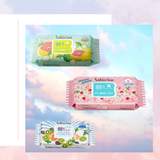Why Do Avocados Benefit for Skin? And How?
Posted on March 23 2020

Do you scour the internet for new dieting trends, as well as worrying about the aging of your skin, on a regular basis? For fun? Lots of people do it. You are not alone. What you’ve likely noticed while you surf the internet is that there is one key ingredient in both dieting and skincare that seems to transcend cross-culturally; I’m talking about the avocado.
Let’s talk about the way we view the good kind of fat.
Why Are Avocados Amazing?

You hear it all of the time, avocados are fatty, but the good kind of fat. They are a staple in Keto, Paleo, and Whole30 diets, because they are full of vitamins C, E, K, and B-6 (For a full list click here.) Not to mention that they’re also full of monounsaturated fats (mono-fats are also found in nuts and olive oils), minerals, and fiber, but also low in carbs, so any low-carb diet will most likely include the crowned Avocado.
Can the Good Kind of Fat, Make the Good Kind of Skin? Avocados, can they do it all?
They’re also delicious. They spread on toast like butter, and taste like it too. Their perfect texture can handle the heat of a poached egg’s runny yoke, as well as the slicing and dicing of a shrimp cocktail’s tomato soup... and through it, all the avocado holds its integrity, shape, and flavor. It’s literally the perfect fruit (yeah, I said it). That’s why they’re good for our health, but what does that have to do with our skin? Let’s talk about it.
Why Are Avocados Amazing for Your Skin?
Wouldn’t it be nice if we could transform our mature minds into our naive younger selves just to wear more sunscreen, sleep longer, and eat more vegetables? Well, we can’t. But we can start doing all three of those things right now! That’ll help.
Considering the old adage, you are what you eat, let’s start with nutrition when we consider our skincare regiment. The two key ingredients in avocado, alpha-linoleic and linoleic acid, work specifically to help keep your skin looking refreshed and glowing because they are part of the essential Omega 3’s that your body needs to combat the dietary related disease. You’ve heard of Omega 3’s because they are the focus of so much conversation when it comes to our nutrition and health.
Foods like, tofu, nato, and konjac, are three ingredients that are helpful in creating better complexion, tighten pores, and smoother skin, but what about the avocado? Well, the avocado does these things and also tastes great on toast! Who doesn’t love an avocado toast? We all love avocado on toast.

Avocado’s Biggest Advocate: Michelle Obama
Well not specifically. Specifically, Michelle Obama was the leading force of the MyPlate initiative that promoted the idea of portioning your meals into two halves, where one half of your plate (for breakfast, lunch, and dinner) should consist of equal parts of fruits and vegetables. This initiative was largely adopted by school districts across the country and was effective in promoting healthier meals in an effort to fight obesity and other diseases that seem to be growing exponentially in the United States.
The success of the MyPlate initiative had to do with awareness. It was an awareness that got people talking about the health of our country in a really unique way. Instead of focusing on adults with bad eating habits, the campaign focused on school-age children who often learn bad eating habits at a very early age. With that in mind, we have to consider that the more we know about our nutrition, and the earlier we know it, the better and healthier we will be.
What about the Bad Kind of Fat?
If an avocado is the good kind of fat, that gives us great skin, and helps us fend off controllable disease, what does the bad kind of fat do?
Saturated fat is the bad kind of fat. This kind of fat can be found in animal fat, coconut and palm oils. It’s bad for you because it increases your cholesterol and that’s the keyword when we’re talking about fat. Cholesterol.
When you visit your doctor for an annual check-up, usually they’ll check your blood for general health and wellness. From that report, you’ll learn the levels of both your ‘bad’ and ‘good’ cholesterol. You don’t need to have a massive ‘good’ amount. You DO need to have enough ‘good’ to level out the ‘bad’. This is where the avocado comes in. Along with nuts and olive oil, your daily intake of avocado’s can ensure that your cholesterol report will always come back reading even, if not totally positive for the ‘good’ kind of fat. This is also why it is always important to see your doctor once annually. Doctors know so much about our health! They can detect underlying conditions that may be impairing our weight loss, or causing outbreaks of acne or dry skin in general. We really don’t know what our body is doing without the sound medical advice of a doctor!
All of that said, Michelle Obama didn’t have to tell us that avocado’s were nature’s cure-all. Her campaign of awareness and general sound advice about nutrition did give us the conversational tools we were lacking as a greater society. Tools that we have since used in order to address the daily intake of fats, carbohydrates, and proteins. She’s the best.

You’re Convinced Aren’t You...
STOP! Before you grab an avo-and start applying it directly to your skin think about your options! There are products that can help. So back away, leave that avocado on the counter until your scrambled whites and brioche are plated! Trust me. It’ll be worth the wait.
For now, it’s important to continue being concerned about your health and your skin.
Scour the internet for as long as you see fit! Don’t let anyone tell you that surfing the web to find your own information is a bad thing. Find the products, fruits, and vegetables that suit your needs and go with it. We’re in the age of time, information and fully informed choice.
Congratulations!
To find out more, visit our website and explore our blog!

Olga Rosales Salinas
A SAHM of two boys living in the Bay Area, she is very interested in skincare and fitness, and how those things create holistic lifestyles. She also writes short stories, poetry, and prose.



